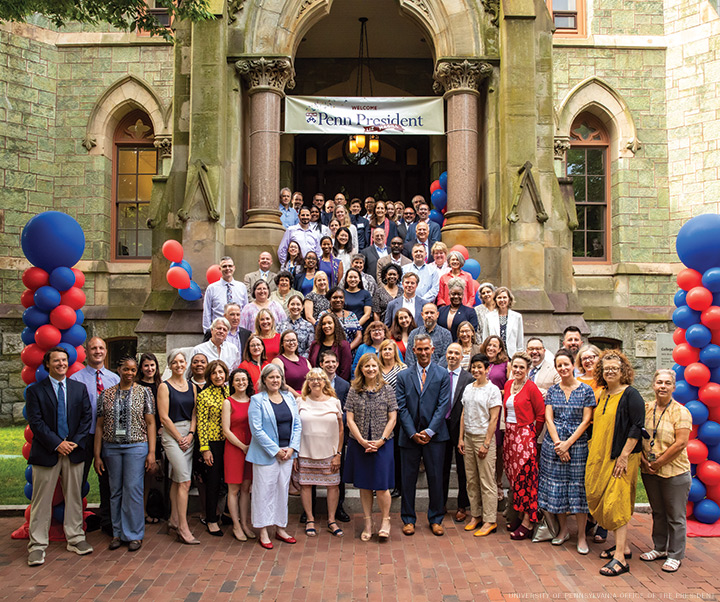
Penn’s new president says growing up in Fargo, North Dakota, is the most memorable thing about her, but former colleagues and University leaders would rather talk about her warmth, attention to others and their ideas, and ability to bring groups together for a common goal (though the Midwestern thing is interesting, too, and perhaps related).
By John Prendergast
Sidebar | Magill on Higher Education
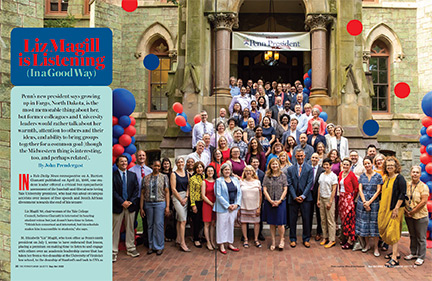
In a Yale Daily News retrospective on A. Bartlett Giamatti published on April 23, 1986, one student leader offered a critical but sympathetic assessment of the baseball-and-liberal-arts-loving Yale University president, who had run afoul of campus activists over issues of free speech and South African divestment towards the end of his tenure:
Liz Magill ’88, chairwoman of the Yale College Council, believes Giamatti is interested in hearing student voices but just doesn’t have time to listen. “I think he’s concerned and interested, but his schedule makes him inaccessible to students,” she says.
M. Elizabeth “Liz” Magill, who took office as Penn’s ninth president on July 1, seems to have embraced that lesson, placing a premium on making time to listen to and engage with others over an academic leadership career that has taken her from a vice-deanship at the University of Virginia’s law school, to the deanship of Stanford’s and back to UVA as executive vice president and provost, and now to College Hall—where she kicked off her administration by greeting hundreds of Penn students, faculty, staff, alumni, and community members at an ice cream social on College Green, where Magill and other senior administrators helped out with the scooping [“From College Hall” in this issue].
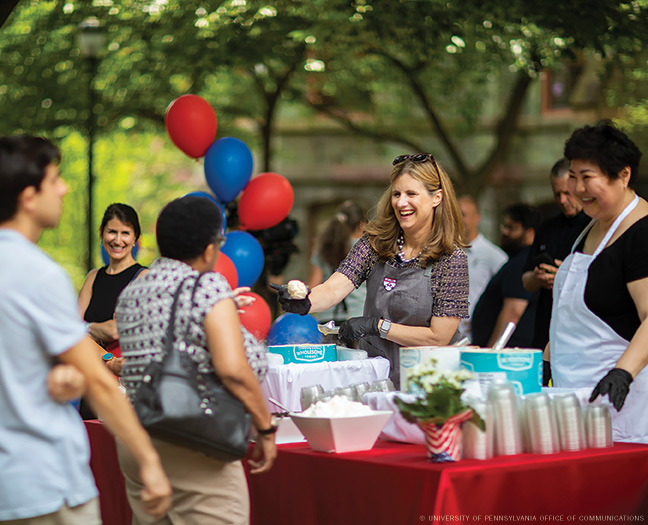
“I thought it was a great idea,” says Scott L. Bok C’81 W’81 L’84, chair of Penn’s board of trustees. “It brought a smile to my face when I saw she was doing that, because I thought, ‘What a great way to just get out in a casual way, nothing scripted, not a lot of prep—you just randomly meet people.’ One might be an administrator, one might be a faculty member, one might be a summer student, and you just chat with all kinds of people who make up the diverse Penn community.”
Bok led the presidential search that resulted in Magill’s selection to succeed President Emerita Amy Gutmann Hon’22, currently US ambassador to Germany [“Gazetteer,” Mar|Apr 2022]. The months since have “solidified my hopes as to what Liz Magill might be able to be in terms of a leader for Penn,” he says. “I think she’s already proven to be very accessible, very curious, wants to know what’s going on: What are the good things, what could be improved, what are the challenges in different parts of the University?”
In the lead up to her term and since arriving, Magill has pursued a “very serious and thorough listening tour, and that will continue over the summer and beyond,” he adds. “People really enjoy talking to her, she seems genuinely interested in their work, she’s passionate about education, she’s excited about coming to Penn,” he says.
Months before donning an apron and asking “vanilla, chocolate, or coffee?” (the last a personal favorite), Magill began familiarizing herself with Penn, meeting with Gutmann before she took up her ambassadorial duties and talking twice a week with Interim President Wendell Pritchett Gr’97, as well as interacting regularly with senior staff, deans, and volunteer leaders. “I spent as much time as I could, without getting overwhelmed, with people who run very large parts of the organization to get to know them and their portfolios,” she says, and visited campus about once a month for in-person briefings. “Since I arrived, I’ve been trying to get out of my office as much as possible. Aside from serving ice cream, I’ve done lots of things meeting people, and that’s been fantastic.”
Opportunities to engage with students have been limited over the summer, though Magill did have a Zoom call with leaders of the Undergraduate Assembly. She also visited with students participating in the Center for Africana Studies Summer Institute for Pre-Freshmen, and at the Shleifer Family Penn First Plus Center in College Hall. Other stops have included the Penn Libraries, Penn Wellness, the offices of public safety and new student orientation, and labs run by Drew Weissman and Carl June, pioneering researchers on mRNA vaccines and CAR-T cell therapies, respectively.
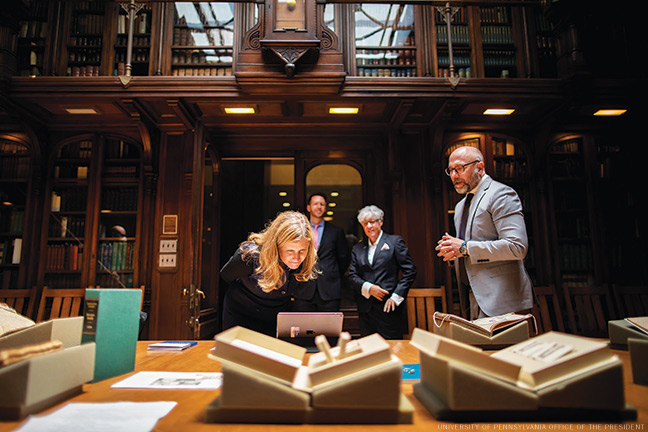
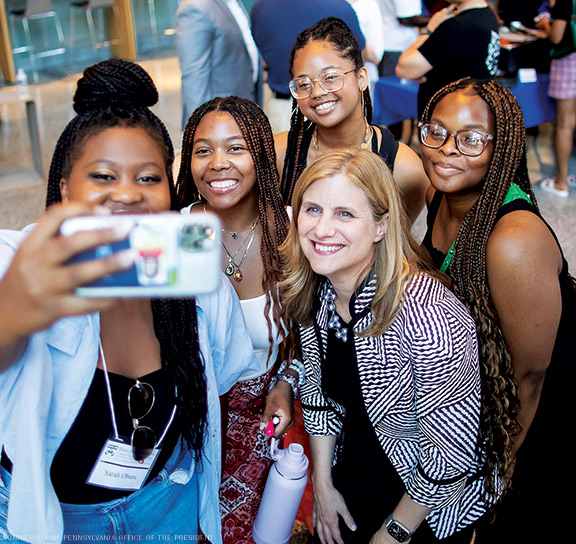
“At the moment I’m really trying to build relationships,” she says, both on campus and with elected officials and civic leaders who partner with Penn. “More broadly, my goal, especially in this first six months, is to listen and learn—what are the thoughts and aspirations of people here about what we do next, what’s their reflection on who we are as an institution? I’m a newcomer here, and I am in love with it already—but I want to learn how this place works and what its aspirations are before I say, ‘These are the three things I really want to do.’”
Emeritus Trustee Lee Spelman Doty W’76, who served on the presidential search committee and placed Magill’s name in nomination at her election in March, points to her openness as a distinguishing quality. “She’s just so personable and engaging. In our first interviews I really felt that she would connect with every single constituency at Penn, which is so important,” Doty says. “She’s very, very collaborative. She’s not somebody who’s going to come in and just do things her way without consulting with [the] broader community.”
As a candidate, Magill was quick to grasp Penn’s strengths and where they could be enhanced, says another committee member, Jennifer Pinto-Martin, the Viola MacInnes/Independence Professor of Nursing who directs the Master of Public Health Program.
One aspect of Magill’s strategic vision that resonated especially, Pinto-Martin says, was “this notion that every student should contribute—that Penn serves.” Citing Franklin’s familiar quote about the noblest question in the world being “what good may I do in it?” Pinto-Martin calls it “integral to Penn’s DNA.” Magill “understood the value of that both in terms of giving back to the community and for the individual student.”
Magill “also just has a spark and an energy about her,” Pinto-Martin adds. “Penn is sort of scrappy,” she says. “We get in there, and we care, and we want to get the job done, and we don’t give up until we get it done, and she has that same quality—and you could feel that as she spoke.”
“I think we’ve been so lucky,” says Doty. “When I first became a board member, it was under Judy Rodin, and we thought we couldn’t find anybody as good as Judy. Then we found Amy, and Amy was amazing, incredible. And now Liz has those big shoes to fill, and I think she will fill them beautifully.”
Magill grew up in Fargo, North Dakota. “I have joked that it’s the most interesting thing about me,” she says. “It’s something that everyone remembers, and that is mostly because no one has ever met anyone from Fargo.” (Before Magill, North Dakota probably came up most often at Penn for thwarting the admissions office’s ambition to have all 50 states represented in each incoming class.)
Magill is the fourth of six children (four boys, two girls); her parents Frank and Mary Magill are both deceased. She attended Nativity Elementary School and Shanley High School in Fargo, graduating in 1984. The M. in her name is for Mary, and in a talk at UVA Magill spoke about how she started calling herself Liz when she was seven years old—a decision that combined the attraction of a name with only three letters for a child just learning cursive and the impulse to establish an identity independent from being “little Mary.” Although it took a while, she said, eventually the name stuck.
“We did as a family, and I did as a kid, absolutely everything,” Magill recalls. “I think my parents’ view was, we have these six children, and they need to have a lot of activities.” In addition to a variety of sports and music (not a strength, she admits), Magill “was pretty involved in student government. I also was a debater in high school,” she adds.
Magill recalls arguments over whether factoring in the wind chill when the temperature was 12 below would be an exaggeration, but despite the extreme weather, her memories of Fargo are warm. “It was an absolutely wonderful place to grow up, very happy memories,” she says. “I feel very lucky in the family I was born into and the parents that I had.”
Yale, where Magill was an undergraduate history major, was “so different from where I had grown up,” she says. Her brother, who was in law school at the time, was deputized to take her to New Haven while her parents were transporting another child to a different school, and “I think he was a little nervous to be dropping off his little sister Lizzie at college,” Magill says. “What happens if she wanted to go home?”
In fact, Magill “absolutely loved it, maybe because of how different it was—from the topography of the High Plains of eastern North Dakota, which is the landscape of my childhood, and just the people,” she says. “I had the classic college experience, meeting people from all over the world, who had all sorts of different interests, who were so different than I was, and just finding real pleasure in that.”
Inspired especially by three scholars then at Yale “who really ignited my interest in history,” Magill envisioned a future career as a history professor. She mentions a lecture class on the American West taught by environmental historian William Cronon; seminars with the late David Brion Davis, an expert on slavery and abolition, and with women’s historian Nancy F. Cott; and the experience of studying original documents and reading important historical texts. “I can’t exactly explain why it resonated with me so much. I just felt, ‘Oh my gosh, this is what I’d like to do with my life.’”
Magill continued her involvement in student government, chairing the Yale College Council, and was active in local politics. “Students in New Haven kind of run one of the wards in the city, so usually a Yale student is elected as an alderman,” she explains, “and that was extremely interesting, too.”
Yale is also where she met her future husband, Leon Szeptycki. A fellow Midwesterner—he grew up in Lawrence, Kansas, where his father was a math professor at the University of Kansas—Szeptycki was in law school at Yale when Magill was an undergraduate. They knew each other through a mutual friend but didn’t start dating until they both ended up in Washington, DC, after graduation in 1988, he says. They’ve been married for 32 years this past July, and have two children: Alex, who graduated from Stanford in May, and Claire, a rising senior at UVA.
On learning that his wife was a candidate for the Penn presidency, “my main reaction was just how perfect the job was for Liz,” Szeptycki says. “She really loves universities, and a big dynamic university like Penn is just such a perfect match for her—I totally understood why she was so excited about the job.”
Szeptycki’s work focuses on water resources and climate change. He’s a law professor at UVA and associate director of the school’s Environmental Resilience Institute. He plans to remain in Charlottesville, Virginia, for the coming school year to continue working on several projects—one is examining the potential environmental, economic, and social impacts in the state from carbon sequestration through tree and crop plantings—and while their daughter completes her senior year at UVA, and then will relocate to Philadelphia.
Magill calls her husband “a renaissance guy” with “all sorts of outside interests,” adding that “a lot of my own interests have been shaped by his: so, I’ve always loved the outdoors, but the version of the outdoors that he loves has just deeply affected me and our kids.”
“I sort of grew up in the outdoors with my dad,” says Szeptycki, who at one point served as general counsel for the nonprofit conservation organization Trout Unlimited. “I love all waters—lakes, the ocean, rivers and streams—and I love to fish as well. At home, we have two canoes in the backyard ready to go at all times.”
But he adds that he is “really excited to move to Philadelphia.” Like Magill, who has fond memories of visiting the city with her family as a child during the US Bicentennial in 1976, Szeptycki is a fan, praising Philadelphia’s combination of tightknit neighborhoods and all the amenities of a major urban center.
For her first four years after college, Magill worked as a senior legislative assistant focusing on energy and natural resources for North Dakota Senator Kent Conrad. Her experience on Capitol Hill ended up shifting her career aspirations somewhat, she says.
Magill’s father Frank was a lawyer, and so are some of her siblings. (“My family is a little bit like a meeting of the legal department when they get together,” she says.) Around the time she started college, her father was appointed to a federal judgeship, but before that he was a practicing lawyer. “So, I grew up with a view that this was a wonderful profession and that it might suit me.”
Magill still wanted to work in higher education but started to reconsider whether pursuing a PhD in history was the best means to that end. “I think working on the Hill for four years made me want to be at a professional school,” she says. “Being a faculty member who did research and teaching, but also [having] that connection to the wider world that you have when you’re training professionals as well as academics.”
She wondered about her “capacity to spend a lot of time in archives, which great historians do,” she adds. “I learned from that work so profoundly, but I wondered about my own patience for it, and so I think that was the combination. I wanted to be at a research university. I knew that, and just choosing the right path, law made sense for me.”
Magill attended law school at the University of Virginia, where she received the Jackson & Walker Award for Academic Achievement for being first in her class after four semesters and the Margaret G. Hyde Award, given by the faculty to an outstanding graduate, and served as articles development editor for the Virginia Law Review. After graduation, she clerked for appeals court judge J. Harvie Wilkinson III in 1995–96 and for Associate Supreme Court Justice Ruth Bader Ginsburg in 1996–97.
Interviewed on NPR’s Weekend Edition Sunday following Ginsburg’s death in September 2020, Magill compared clerking for her to “being a kid in a candy store—a very demanding candy store that took a lot of work,” recalling late nights on the telephone line-editing opinions with the justice, famous for her meticulousness and “night owl tendencies.”
She praised Ginsburg as a teacher and mentor to her clerks, sharing her insights into her own and colleagues’ ways of thinking about cases and modeling “an approach to professional life, personal life, family life that I think all of us—male and female—who clerked for her absorbed.”
One thing that stood out was that Ginsburg was always “very much herself,” Magill said. “She didn’t segregate parts of her life in a way that I think many young professionals are taught to do to succeed, and so that was a very important model.”
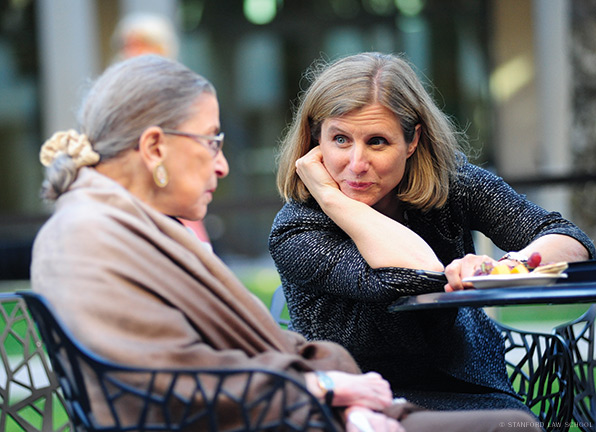
For her part, Ginsburg called Magill “the kind of law clerk I wish I could have kept forever” and “one of the most outstanding law deans in the United States,” when Magill interviewed her at the World Justice Forum in the Hague, Netherlands, in 2017. By that time, Magill was into her second five-year term as dean of Stanford’s law school, but she started her academic career the year after her clerkship ended back at the University of Virginia.
She spent 15 years on the faculty there, teaching classes and publishing articles in her specialties of administrative and constitutional law. In 2009, she was named vice dean, responsible for the school’s curriculum and student affairs, among other areas. After Magill was appointed dean of Stanford’s law school in 2012, an article in Stanford Lawyer magazinequoted her dean at UVA, Paul G. Mahoney, as saying, “I knew it was going to happen sooner or later. There was never any doubt in my mind that she has all of the skills necessary to be an excellent dean. So it was bound to become obvious to others.”
As the Richard E. Lang Professor of Law and Dean of the Stanford Law School, Magill reshaped the faculty, overseeing 19 new hires, including 10 tenured positions, spurred by faculty retirements. She also launched two signature programs: the Law & Policy Lab, in which students, aided by faculty advisers, could work with real-world clients in a variety of legal specialties; and a Global Initiative designed to expose students to different legal and political environments by combining classroom education in international legal practices with study in other countries. According to the Stanford News, the law school raised more than $130 million on Magill’s watch and set several records for annual giving.
Stanford Law’s current dean, Jennifer Martinez, first met Magill when she joined the faculty and served as associate dean for curriculum for two years during her term. “She’s very decisive when she needs to be, but she’s also very inclusive, listens very well to others, and is open to taking in all the different perspectives in a situation before reaching a decision,” Martinez says.
Martinez highlighted Magill’s role in piloting the new programs through their development—“The way she is able to get input from so many people to make things even better is just terrific to watch”—and her skill in managing the faculty hiring process. “Liz was really instrumental in both impressing on the faculty the urgency of hiring given the imminent retirement cohort and also great at recruiting people to accept our offers and actually come to Stanford.”
Though Martinez was already tenured when Magill arrived, “I feel lucky to have gotten to work with her,” she says, and she felt that Magill mentored her as an associate dean. The junior faculty who came to Stanford during her deanship “really adored her because she is such a good mentor.”
And she names Magill as an “important scholar” of administrative and constitutional law. “I’ve read her work and also had the opportunity to teach in a classroom with her” in a course on constitutional law, she says. In the classroom, Magill is “a natural with students. She’s a very clear instructor, very funny, and just has a way of taking really complicated concepts and making them understandable.”
After seven years at Stanford, Magill returned to the University of Virginia to become the school’s first female provost and executive vice president, recruited by recently appointed UVA President James E. Ryan. The two were old friends from the time they were starting out in the law school faculty at UVA in 1998.
“We were professional colleagues and friends, but we were also family friends,” says Ryan. “My wife Katie and I spent a lot of time with Liz and Leon and their two kids Alex and Claire, who are the same age as a couple of our kids. So we spent a lot of weekends together, took trips together. She was one of my closest friends when I was on the faculty, and we’ve remained close ever since.” (Even earlier, they were both at Yale as undergraduates, he adds, but “I don’t think our paths crossed—in part because Liz was the student council president, and I was a rugby player, and those worlds didn’t overlap that often.”)
Ryan calls Magill’s leaving UVA “bittersweet—I was sad to see her go, but I was excited for her. It seemed like a great opportunity.” As provost, “she was my partner in basically every important decision I made.”
The provost’s portfolio at UVA is a broad one, overseeing the deans of all the schools, the libraries, an array of centers and institutes, and more, he says. “One of the things that Liz is really spectacular at is recruiting people and onboarding them.” Under Magill’s direction, UVA has attracted “the most talented set of deans and the most diverse set of deans” in its history, he says. “And she brought the deans together to work as a group in a way that I certainly hadn’t seen before, and again I think that’s due to her leadership,” he says. She was also willing to take on “really important but less glamorous aspects of university leadership and administration”—for example, heading an effort to revamp the school’s financial model.
“I think it’s fair to say that Liz has a remarkable range in so far as she can get into a budget, but she also has an incredibly high EQ [Emotional Quotient],” he says. “It’s one of the reasons why people who work with her end up not just trusting her, which they do, but becoming incredibly loyal to her and adoring her as a person.”
At the same time, Magill is able to say no—a necessary skill for a provost or president. “I think she understands that, in some ways, you’re showing someone respect if you are straightforward in saying, ‘I’m sorry I can’t do that and here’s why,’ rather than putting it off or suggesting that you might be able to do that,” he says. “And I think that earned her the respect certainly of the deans but also of the leaders of the faculty senate and board members” at UVA.
Asked what Penn alumni should know about their new president, Ryan answers: “She would not have gone to Penn without falling in love with it first. Because the question I asked her was ‘Why Penn?’ and at first she said, ‘I’m not sure, but it seems like a really interesting place,’ and I think through the process of interviewing and getting to know the university she really came to admire it and fall in love with it.
“She is someone who believes deeply in the power of higher education, deeply in the power of research universities, and so what the alumni should know is they’re incredibly fortunate to have her, and I can’t imagine someone better to lead Penn at this time.”
With some admitted exceptions, successful leaders of academic institutions—which are supposed to be, well, collegial—usually come equipped with a respectable set of interpersonal skills. But judging from the comments of those involved in Penn’s search and her former colleagues, Magill’s do appear to be of a different order of magnitude.
“She has a Midwestern genuineness about her that is just unmistakable. Of all the candidates, she listened and asked questions so intently,” says Pinto-Martin. “She just tunes in. You know you have her full attention. You feel valued, you feel heard. I think that kind of personal connection has served her incredibly well and will continue to serve her incredibly well.”
Magill admits to having heard this kind of comment before. “If the claim is that I’m nice, I own it—I’ll take that. I don’t know if it’s Midwestern, I don’t know if it’s growing up in a family of six, I’ve never reflected deeply on it, because it’s just how I am,” she says.
As a leader, “I want to understand, I want to figure out what the priority should be, and I want to get stuff done. So I want to advance those priorities, after learning and understanding—from all the people you should learn from—what’s next,” Magill says. “To the extent I am good with people—and I’m not conceding that I am, because I’m Midwestern—I think it comes out of the fact that I just have deep respect for other human beings and I believe in treating people with respect and dignity—everyone, always.”
As a vice dean at UVA and in her position at Stanford, Magill was notable in her range of involvement in various types of committees and special projects. One fraught subject she took on, at Stanford, was cochairing an effort to revise the school’s policies and practices on sexual assault. Such activities—what she calls “extra duties as assigned”—don’t appeal to everyone. “Most of the people who might become a dean, or provost, or president are faculty,” she says. “And they went into that to teach and research—that’s their passion.”
Though she shares those loves, early in her career Magill was presented with opportunities to lead committees or take on other responsibilities, “and I felt like, to the extent I was good at that, I could have greater impact in advancing those missions of teaching, research, and service,” she says.
“I deeply believe that leadership is a privilege and an opportunity, and I’m not a reluctant leader,” she adds. “I mean, some days I’m tired or I find the job difficult, but fundamentally I feel deep gratitude that people want me to do these things and think I can contribute.”
She is also inspired by the example of others who’ve had an impact on their organizations. “My aspiration to do this or any leadership job is affected by the leaders I’ve seen and what a difference I feel they make to the culture, the accomplishments, however you want to measure it.”
One lesson she drew from Stanford was that an academic leader leads the entire institution and not just the faculty. “Understanding that the people who work supporting the mission, maybe not delivering the mission directly, that their careers are really important to them, and they are thinking about their own learning and how they can be better at that job, I found that a really educational and inspiring part of being a dean.”
While she’d gained some experience at Stanford with other parts of the university from working with fellow deans and the president and provost there, at “UVA the learning curve was really steep,” she says.
“I was part of eight searches for deans—some I led or co-led, some I was just part of.” Through those, she learned about engineering, medicine, architecture, nursing, public policy, and so on. “When you’re searching for a new leader of a school, you learn a lot about their thoughts and aspirations, who they are, what they want to do.”
Of the “super nerdy, really important” task of revamping UVA’s budget model, Magill credits the work of “a great group of professionals and the deans,” in attempting to bring “simplicity and transparency” to a “very complex, Rube Goldberg” system in which “everything was accounted for, but nobody understood it.”
Her deep immersion into the intricacies of the larger institution was accelerated by the arrival of the COVID-19 pandemic, which took hold a little more than six months into her tenure as provost and EVP. The challenging experience allowed her to learn “more about a large, complex university than I would normally have been able to do in a three-year stint,” she says. “So I feel much more prepared to take on the responsibility of leadership of Penn.”
When Magill took office on July 1, she was joined by Michael Citro, who had worked with her in a similar capacity at UVA, as vice president and chief of staff. In August, James Husson, most recently of Boston College, was named Vice President for Development and Alumni Relations, replacing John Zeller, architect of the record-breaking Making History and Power of Penn campaigns, who retired over the summer. Magill says that searches will also begin soon for the deans of the Graduate School of Education and Penn Carey Law School, who are both in the last year of their terms, and for the provost, where bioengineering professor Beth Winkelstein EAS’93 has been serving on an interim basis since July 2021.
Magill is also eager to get out and meet Penn alumni. Starting in January, she’ll do a series of events, with stops in New York, Los Angeles, San Francisco, London, and Washington, DC, as well as Philadelphia, she says, “to meet our alumni in a more formal way.”
In the meantime, plans are underway for her inauguration as president, which is scheduled for October 21, just before Homecoming Weekend (at which Magill and her dog Olive will start a 5K race Saturday morning). Details had not been made public as the Gazette went to press, but in addition to the formal ceremony and Magill’s inaugural address in the morning, activities will include a picnic and musical performances on College Green and a discussion program in Irvine Auditorium with Magill in conversation with a major speaker in the afternoon.
“I think of it as a celebration of all things Penn. It’s a kind of institutional rite of passage, to reflect on our past, our present, our future, and so I’ve thought of it as a lot of Penn, Philly, and West Philly, and a little bit of Liz Magill,” she says—with what can only be called Midwestern modesty.
Sidebar
Magill on Higher Education
Penn President Liz Magill, a passionate advocate for higher education, had some thoughts when asked about its role in and value to society—much discussed in our own politically contentious time and, as it turns out, a perennial subject of debate.
With her own upcoming inaugural address in mind, Magill has been sampling past examples of the genre. “I’ve been reading lots of inaugural speeches of prior presidents of many universities at different times and most of them talk about what’s the value of higher education,” she says.
“I think the role of American higher education, broadly described, is to educate the next generation across all disciplines and future professions; to provide opportunities for families and individuals to make rewarding lives for their children; to develop, transmit, and share knowledge, work on discoveries that will solve societal problems. At a place like Penn [with an academic medical center], we also have a clinical mission of caring for the community.”
Those missions, she adds, are as vital as they’ve ever been. “There are lots of important things we need to do, to think about and respond to the many problems we face right now: emerging from the pandemic, declining faith in institutions, the future of human health, the future of the planet’s health—these are huge challenges that require discovery, knowledge, training people who can take those on,” she says.
“I have no doubt about the value of what higher education institutions do—and we may need to work on how we communicate about that a little bit more—but I think higher education institutions have been and always will be part of this great project we call, you know, human civilization.”
Another key feature is regular renewal. “Higher education has had these core missions,” she says, “but all institutions have changed over time—and that’s because we have the next generation we’re educating, and their thoughts, their aspirations, their learning what they want to do with their lives, affects us as well, and so we are constantly changing as a result of that connection to the next generation.”



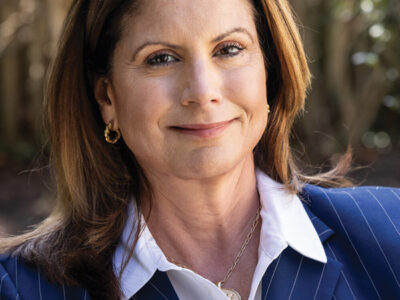

Really Liz. You need not try so hard to match Amy Gutman in glibness. And, off the bat, on the first day for Freshwoperdaughtress, you treated them as kindie children. I am an alumnus, and I had hoped that you would show yourself to be an intellectual leader. It has been only a few weeks. You still have time to pull up your socks.